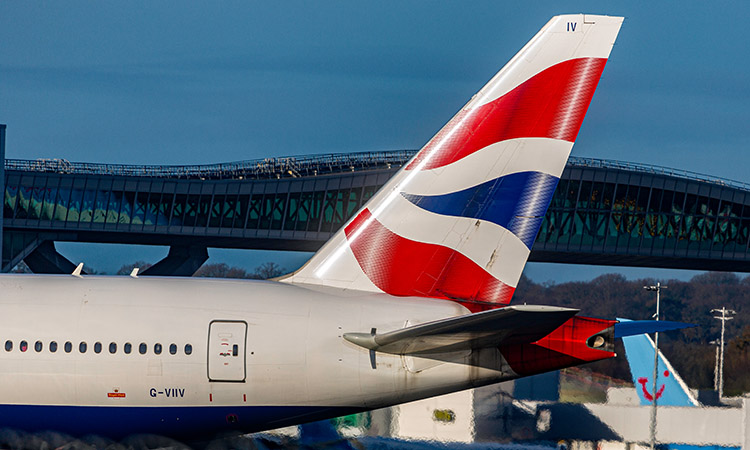Calls made for urgent airport support package following suspension of all travel corridors in UK
- Like
- Digg
- Del
- Tumblr
- VKontakte
- Buffer
- Love This
- Odnoklassniki
- Meneame
- Blogger
- Amazon
- Yahoo Mail
- Gmail
- AOL
- Newsvine
- HackerNews
- Evernote
- MySpace
- Mail.ru
- Viadeo
- Line
- Comments
- Yummly
- SMS
- Viber
- Telegram
- Subscribe
- Skype
- Facebook Messenger
- Kakao
- LiveJournal
- Yammer
- Edgar
- Fintel
- Mix
- Instapaper
- Copy Link
Posted: 18 January 2021 | International Airport Review | No comments yet
With all travel corridors with the UK now temporarily suspended in order to protect the nation from the importation of new strains of COVID-19, the Chief Executive Officer of the AOA has once again stressed the urgency of immediate financial support for the UK airport and aviation industry.


The UK government has announced emergency border measures to prevent the spread of concerning new variants of COVID-19 into the UK, such as those first identified in Brazil and South America, and to protect the nation against the risk of as yet unidentified new strains.
From 18 January 2021, all travel corridors with the UK will be temporarily suspended – meaning that all international arrivals who have departed from or transited through any country outside the Common Travel Area in the previous 10 days will be required to take a pre-departure test and then self-isolate immediately for 10 days upon arrival. This includes British and Irish nationals.
This urgent action is in response to increasing concern over the transmissibility and virulence of new strains evolving internationally. It will also ensure that the government is able to protect the progress being made on the country’s vaccination programme.
This move will be supported by increased enforcement, both at the border and across the UK, with Border Force increasing the number of spot checks on passengers that have entered the country.
International travel corridors have been in place since July 2020 for countries and territories where critical analysis suggests that the risk of COVID-19 can be mitigated.
However, the level of risk associated with the emergence of new variants globally has now increased, requiring more stringent measures to block all potential avenues through which new strains of the virus could enter the UK while the government considers how best to respond.
The new measures will be reviewed on 15 February 2021 – while further work takes place to manage the threat posed by coronavirus variants.
The UK’s Transport Secretary, Grant Shapps, said: “We are operating in a completely new environment in our fight against COVID-19, with several worrying new strains of the virus emerging across the globe. Now more than ever, as we make strides vaccinating people up and down the country, we need to take advantage of all measures available to us – and these robust emergency precautions will help us to protect the nation to ensure that we continue to make progress.”
As has been the case throughout the pandemic – the government is moving quickly in response to the latest scientific evidence, and it has committed to continue to take swift action in banning travel from countries where new strains are formally identified, as has been done previously.
These measures are considered the right course of action now, to safeguard public health and prevent new strains of the virus from worsening the existing picture within the UK.
National restrictions for England introduced on 6 January 2021 remain in place, meaning that everyone must stay at home unless travelling for a very limited set of reasons. Those in breach of the lockdown rules face penalties starting at £200, rising to a maximum of £6,400.
The closure of all the UK travel corridors will ensure that, for those returning from trips that fall into this limited set of exemptions, and for passengers arriving to the UK from abroad, there is a clear and robust set of measures to prevent cases of coronavirus entering the country.
A number of exemptions to the travel corridor policy – including the need to travel for business – will be suspended from 18 January 2021, unless they are vital to maintaining the flow of critical goods, protecting essential services, protecting national security or facilitating government work.
The government’s Test to Release scheme will remain in place, giving passengers the option to shorten the mandatory self-isolation period to as little as five days. However, they will still need to adhere to national restrictions in place upon release from self-isolation.
Responding to the announcement that all travel corridors will be suspended, Airport Operators Association’s (AOA) Chief Executive, Karen Dee, said: “The closure of travel corridors is understandable from a public health perspective, but this adds to the current near-complete shutdown of the UK’s airports, which are vital for our post-pandemic prosperity. This is making a devastating situation for UK airports and communities relying on the jobs and economic benefits that aviation brings, worse.”
“The UK and devolved governments now need to set out as a matter of extreme urgency how they will support airports through this deepening crisis. Business rate support, announced in 2020 and, in England, not yet even open to applications, is no longer sufficient to ensure that airports can weather the difficult months ahead.”
“Airports are currently keeping their infrastructure open to support vital and critical services, such as post, freight, emergency services, military and Coastguard flights, as well as to help keep the lights in the UK on through supporting flights to offshore oil, gas and wind operations.”
“Airports are doing so while running on empty – there is only so long that they can run on fumes before having to close temporarily to preserve their business for the future. Government needs to help cover airports’ operational costs by, for example, urgently providing relief from regulatory, policing, air traffic and business rates costs in the current and the coming tax year,” she concluded.
Related topics
Aeronautical revenue, Airport crisis management, Border control, COVID-19, Funding and finance, Regulation and Legislation, Safety

















